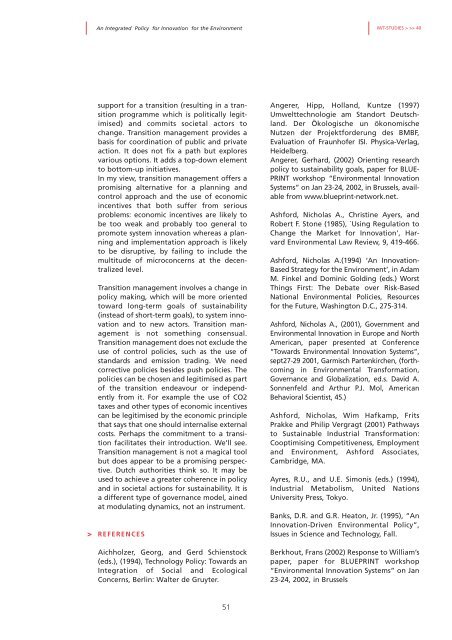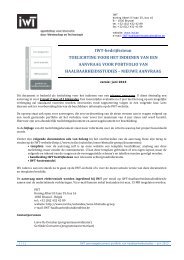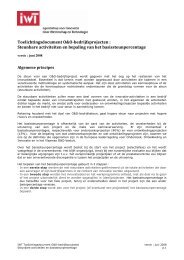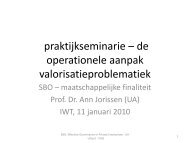40 Innovation Policy and Sustainable Development - IWT
40 Innovation Policy and Sustainable Development - IWT
40 Innovation Policy and Sustainable Development - IWT
Create successful ePaper yourself
Turn your PDF publications into a flip-book with our unique Google optimized e-Paper software.
An Integrated <strong>Policy</strong> for <strong>Innovation</strong> for the Environment<br />
<strong>IWT</strong>-STUDIES > >> <strong>40</strong><br />
><br />
support for a transition (resulting in a transition<br />
programme which is politically legitimised)<br />
<strong>and</strong> commits societal actors to<br />
change. Transition management provides a<br />
basis for coordination of public <strong>and</strong> private<br />
action. It does not fix a path but explores<br />
various options. It adds a top-down element<br />
to bottom-up initiatives.<br />
In my view, transition management offers a<br />
promising alternative for a planning <strong>and</strong><br />
control approach <strong>and</strong> the use of economic<br />
incentives that both suffer from serious<br />
problems: economic incentives are likely to<br />
be too weak <strong>and</strong> probably too general to<br />
promote system innovation whereas a planning<br />
<strong>and</strong> implementation approach is likely<br />
to be disruptive, by failing to include the<br />
multitude of microconcerns at the decentralized<br />
level.<br />
Transition management involves a change in<br />
policy making, which will be more oriented<br />
toward long-term goals of sustainability<br />
(instead of short-term goals), to system innovation<br />
<strong>and</strong> to new actors. Transition management<br />
is not something consensual.<br />
Transition management does not exclude the<br />
use of control policies, such as the use of<br />
st<strong>and</strong>ards <strong>and</strong> emission trading. We need<br />
corrective policies besides push policies. The<br />
policies can be chosen <strong>and</strong> legitimised as part<br />
of the transition endeavour or independently<br />
from it. For example the use of CO2<br />
taxes <strong>and</strong> other types of economic incentives<br />
can be legitimised by the economic principle<br />
that says that one should internalise external<br />
costs. Perhaps the commitment to a transition<br />
facilitates their introduction. We’ll see.<br />
Transition management is not a magical tool<br />
but does appear to be a promising perspective.<br />
Dutch authorities think so. It may be<br />
used to achieve a greater coherence in policy<br />
<strong>and</strong> in societal actions for sustainability. It is<br />
a different type of governance model, ained<br />
at modulating dynamics, not an instrument.<br />
REFERENCES<br />
Aichholzer, Georg, <strong>and</strong> Gerd Schienstock<br />
(eds.), (1994), Technology <strong>Policy</strong>: Towards an<br />
Integration of Social <strong>and</strong> Ecological<br />
Concerns, Berlin: Walter de Gruyter.<br />
Angerer, Hipp, Holl<strong>and</strong>, Kuntze (1997)<br />
Umwelttechnologie am St<strong>and</strong>ort Deutschl<strong>and</strong>.<br />
Der Ökologische un ökonomische<br />
Nutzen der Projektforderung des BMBF,<br />
Evaluation of Fraunhofer ISI. Physica-Verlag,<br />
Heidelberg.<br />
Angerer, Gerhard, (2002) Orienting research<br />
policy to sustainability goals, paper for BLUE-<br />
PRINT workshop “Environmental <strong>Innovation</strong><br />
Systems” on Jan 23-24, 2002, in Brussels, available<br />
from www.blueprint-network.net.<br />
Ashford, Nicholas A., Christine Ayers, <strong>and</strong><br />
Robert F. Stone (1985), `Using Regulation to<br />
Change the Market for <strong>Innovation</strong>', Harvard<br />
Environmental Law Review, 9, 419-466.<br />
Ashford, Nicholas A.(1994) ‘An <strong>Innovation</strong>-<br />
Based Strategy for the Environment’, in Adam<br />
M. Finkel <strong>and</strong> Dominic Golding (eds.) Worst<br />
Things First: The Debate over Risk-Based<br />
National Environmental Policies, Resources<br />
for the Future, Washington D.C., 275-314.<br />
Ashford, Nicholas A., (2001), Government <strong>and</strong><br />
Environmental <strong>Innovation</strong> in Europe <strong>and</strong> North<br />
American, paper presented at Conference<br />
“Towards Environmental <strong>Innovation</strong> Systems”,<br />
sept27-29 2001, Garmisch Partenkirchen, (forthcoming<br />
in Environmental Transformation,<br />
Governance <strong>and</strong> Globalization, ed.s. David A.<br />
Sonnenfeld <strong>and</strong> Arthur P.J. Mol, American<br />
Behavioral Scientist, 45.)<br />
Ashford, Nicholas, Wim Hafkamp, Frits<br />
Prakke <strong>and</strong> Philip Vergragt (2001) Pathways<br />
to <strong>Sustainable</strong> Industrial Transformation:<br />
Cooptimising Competitiveness, Employment<br />
<strong>and</strong> Environment, Ashford Associates,<br />
Cambridge, MA.<br />
Ayres, R.U., <strong>and</strong> U.E. Simonis (eds.) (1994),<br />
Industrial Metabolism, United Nations<br />
University Press, Tokyo.<br />
Banks, D.R. <strong>and</strong> G.R. Heaton, Jr. (1995), “An<br />
<strong>Innovation</strong>-Driven Environmental <strong>Policy</strong>”,<br />
Issues in Science <strong>and</strong> Technology, Fall.<br />
Berkhout, Frans (2002) Response to William’s<br />
paper, paper for BLUEPRINT workshop<br />
“Environmental <strong>Innovation</strong> Systems” on Jan<br />
23-24, 2002, in Brussels<br />
51
















